The 2023 ULE was undertaken to collect information on the status of operation and updated characteristics of establishments. Data were gathered using face-to-face interview of respondents or through self-accomplishment and submission to the PSA. The face-to-face interview was done through the computer-aided personal interview (CAPI) where the Android Tablet-Based ULE Application was used. In cases where CAPI cannot be used, the printed paper questionnaire was utilized. For respondents who preferred to accomplish the Inquiry Form by themselves, two options were made available – web-based/online questionnaire and fillable pdf form. The 2023 List of Establishments (LE) is generated based on the nationwide updating activity conducted by the Philippine Statistics Authority (PSA) in 2023, which covers all the 42,047 barangays nationwide from which 29,797 barangays have listed establishments in the preliminary 2022 List of establishments.
Number of establishments in Cordillera increased in 2023
According to the 2023 Updating of the List of Establishments (ULE), there were 29,846 number of establishments in operation in the Cordillera Administrative Region (CAR). This accounted for 2.4% of the county's total number of 1,246,373 establishments. This was higher from the 2018 LE with 22,540 total number of establishments comprising 2.1% of the country’s total number of 1,080,810 establishments; and from the 2021 LE with 23,513 total number of establishments comprising 2.3% of the country’s total number of 1,003,111.
The National Capital Region (NCR) had the greatest number of establishments with 223,705. CALABARZON was the next largest with 190,480 establishments. Central Luzon came in third with 156,091 establishments.
On the other hand, the following regions recorded the least number of establishments: Caraga with 27,275 establishments, MIMAROPA with 27,043 establishments and BARMM with 11,241 establishments (Table 1 and Figure 1).
Figure 1. Number of Establishments by Region, Philippines: 2023
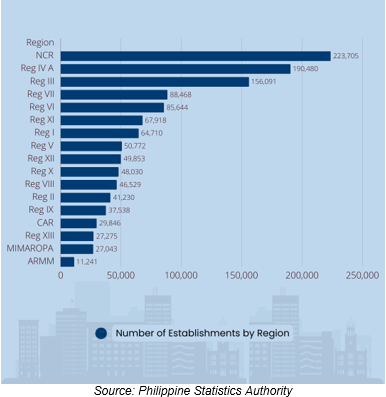
Table 1. Number of Establishments by Region, Philippines: 2021, 2022 and 2023
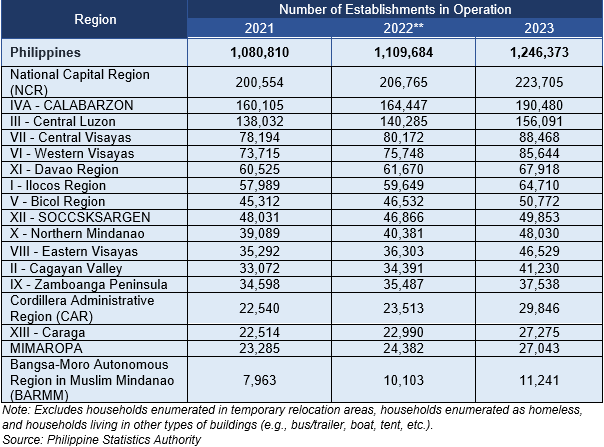
Wholesale and Retail Trade, Repair of Motor Vehicles and Motorcycles are major economic sector in Cordillera
The majority of businesses in CAR were in the Wholesale and Retail Trade, Repair of Motor Vehicles and Motorcycles Sector with 14,698 establishments (49.2%), followed by Accommodation and Food Service Activities with 5,750 establishments (19.3%) and Manufacturing with 2, 706 establishments (9.1%) (Table 2 and Figure 2).
The region’s largest industries in terms of employment were Wholesale and Retail Trade, Repair of Motor Vehicles and Motorcycles Sector with 42,055 total employments (29.8%), followed by Accommodation and Food Service Activities with 26,283 total employments (18.6%), and Administrative and Support Service Activities with 14,812 employments (10.5%).
Table 2. Total Number of Establishments and Total Number of Employment of Establishments by Area Industry Section, CAR: 2023
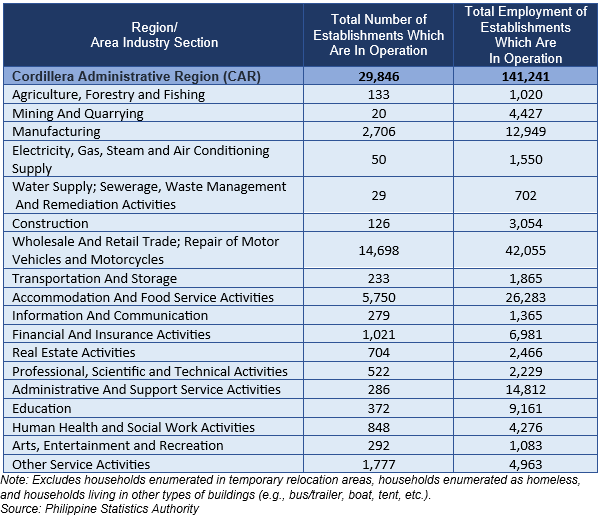
Figure 2. Top 3 Economic Sectors, CAR: 2023
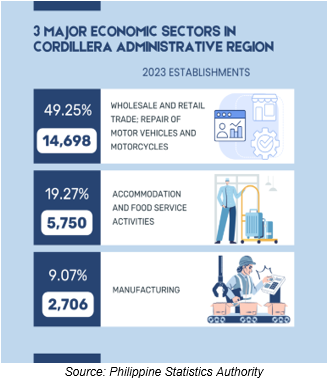
Establishments are concentrated at Benguet and Baguio
With 21,048 establishments, Benguet (including Baguio City) continued to be the province with the most number of establishments in CAR. These establishments made up 70.5% of all establishments. This was followed by Mountain Province with 2,109 establishments and a share of 7.1%. Abra came in third with 1,897 establishments contributing 6.4%; Ifugao with 1,859 establishments and with 6.2% share; Kalinga with 1,798 establishments and with 6.0% share; and Apayao with 1,135 establishments and with 3.8% share (Figure 3).
Benguet establishments employed the most
Benguet (including Baguio City) remained the province with the highest total employment with 110,668 people in establishments which accounted for 78.4% of all employment in the Cordillera. Kalinga, which has 7,908 total employment of establishments and a 5.6% share, came second. With 6,969 total employment of establishments and a 4.9% contribution, Abra ranked third. The lowest number of employments of operational establishments were: Apayao with 4,312 and a share of 3.1%; Mountain Province with 5,141 and 3.6% share; and Ifugao with 6,243 with a 4.4% share (Figure 4).
Figure 3. Total Number of Establishments by Province, CAR: 2023
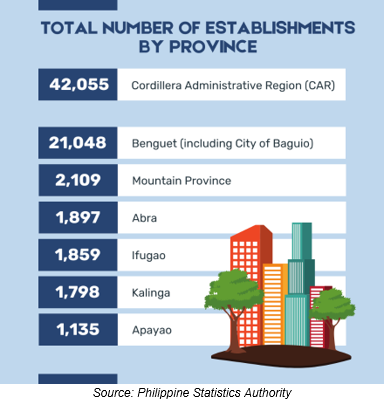
Figure 4. Total Number of Employment of Establishments by Province, CAR: 2023
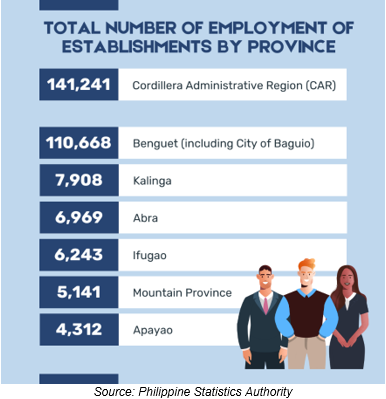
(SGD)
VILLAFE P. ALIBUYOG
Regional Director
Technical Notes
Establishment is defined as an economic unit under a single ownership or control, i.e. under a single legal entity which engages in one or predominantly one kind of economic activity and at a single fixed physical location.
Ambulant peddlers and hawkers and movable stalls either along a public road or in a marketplace, as they do not have a fixed business location, are not considered as establishments.
Similarly, open stalls in shopping centers, malls and markets are not considered establishments as they do not have permanency of business location.
Individual professionals, technical workers or craftsmen who do not maintain fixed offices or shops are also excluded.
Legal Organization (LO) is the legal form of the economic entity that owns the establishment.
Single Proprietorship refers to a business establishment organized, owned and managed by one person, who alone assumes the risk of the business enterprise.
Partnership refers to an association of two or more individuals for the conduct of a business enterprise based upon an agreement or contract.
Government Corporation refers to a corporation organized for private aim, benefit or purpose with the government as the majority stockholder, regardless of whether they are stock or non-stock corporations.
Corporation refers to an artificial being created by operation of law, having the right of succession, and the powers, attributes and properties expressly authorized by law.
Stock Corporation refers to an ordinary business corporation organized by private persons, created and for the purpose of making a profit which may distributed to stockholders on the basis of their invested capital.
Non-stock, Non-profit Corporation refers to a business corporation which does not issue stock to its members and are created not to profit but for the public good and welfare.
Cooperative refers to an organization composed primarily of small producers and/or consumers who voluntarily join together to form a business enterprise.
Philippine Standard Industrial Classification (PSIC) is a detailed classification of industries prevailing in the country according to the kind of productive activities undertaken by establishments. Vital acts and events are the births, deaths, fetal deaths, marriages, and all such events that have something to do with an individual's entrance and departure from life together with the changes in civil status that may occur to a person during his lifetime. Recording of these events in the civil register is known as vital or civil registration and the resulting documents are called vital records.

